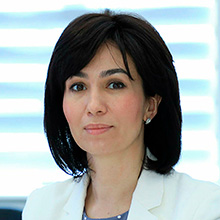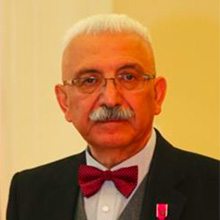
The debate about the “Corridors War” is not based on reality  By Benyamin Poghosyan, PhD, Chairman, Center for Political and Economic Strategic Studies By Benyamin Poghosyan, PhD, Chairman, Center for Political and Economic Strategic Studies
The "corridors war", currently being hotly debated among experts, pundits, and policy-making circles in the South Caucasus, is largely based on wishful thinking rather than hard facts. In reality the options are rather limited.
Since the end of the 2020 Karabakh war, the theme of competing corridors in the South Caucasus has established itself as one of the primary topics for discussion and debate among experts, pundits, and policymaking circles. Almost daily, Azerbaijan and Turkey speak about the necessity to open the so-called "Zangezur corridor," arguing that it will significantly boost the regional economy. According to Baku and Ankara, the opening of the corridor is envisaged under the terms of the November 10, 2020, trilateral statement, even though the document itself speaks about only one corridor – Lachin. Under the term “corridor”, Azerbaijan envisages an arrangement which will allow Azerbaijani vehicles and trains to cross the Armenia – Azerbaijan border, pass via the Syunik province of Armenia and then enter the Nakhijevan Autonomous Republic (an Azerbaijani exclave), without any border, passport, and customs control implemented by the Armenian side. READ MORE
- EGF Editor |
Published on EGF: 09.11.2021
| External Relations
-
Parliamentary Procedures in Service of Democracy  By G.R. Malikova, Doctor of Legal Sciences, Professor at The Academy of the General Prosecutor’s Office of the Republic of Uzbekistan By G.R. Malikova, Doctor of Legal Sciences, Professor at The Academy of the General Prosecutor’s Office of the Republic of Uzbekistan
The rule of law is ensured in a democratic society through a fair, impartial and effective administration of justice. This type of administration of justice requires independent and impartial judges and prosecutors who ensure the preservation of individual rights and freedoms as well as the maintenance of public order. Regardless of how different prosecutors’ systems are in different countries, they all have one element in common. Prosecutors must make decisions independently and carry out their responsibilities free of outside pressure or intervention, while adhering to the principles of separation of powers and accountability. As the President of the Republic of Uzbekistan Sh. Mirziyoyev rightly noted: “Our people can endure any difficulties, but they will not tolerate injustice”. In this regard, the essence of the mission for prosecutors is to ensure social justice and the rule of law.
READ MORE
- EGF Editor |
Published on EGF: 04.11.2021
| Security
-
Elections as a Political Institution of Interaction Between the State and Civil Society  By Gulnoza Ismailova, Doctor of Law Sciences (Habilitation à Diriger des Recherches), By Gulnoza Ismailova, Doctor of Law Sciences (Habilitation à Diriger des Recherches),
Vice-rector for Science and Innovation at the University of World Economy and Diplomacy and Member of the Central Election Commission.
Citizens of the Republic of Uzbekistan have the right to participate in public affairs, including in the activities of civil society, and through their right to freedom of association to form and join civil society organizations. Such organizations play a crucial role in democratic development due to their ability to represent public interests. It is civil society that is the main beneficiary of a democratic order, an effectively functioning socio-political and socio-economic system as a whole. I. Kant considered the formation of civil society as a compromise between the freedom of an individual citizen and the freedom of others. Thus, human rights and freedoms do not depend on the state, but on society and the institutions that refer to it. Thus, in the theory of I. Kant, the actors of civil society are social groups and social and public institutions (family, school, neighborhood communities, associations, communities, etc.), which provide an opportunity to realize inalienable human rights.
READ MORE
- EGF Editor |
Published on EGF: 28.10.2021
-
New Horizons of Cooperation Between Uzbekistan and the European Union  By Eldor Aripov, Director of the Institute for Strategic and Interregional Studies under the President of the Republic of Uzbekistan By Eldor Aripov, Director of the Institute for Strategic and Interregional Studies under the President of the Republic of Uzbekistan
Uzbekistan is on the eve of an important political event - the presidential elections in the country. This major political event was launched at the meeting of the Central Election Commission of the Republic of Uzbekistan, which took place on July 23, 2021. Today, the election campaign is in full swing, and it is taking place in a new political atmosphere. All processes are conducted openly, transparently and in accordance with the national electoral legislation and the time frames specified therein. All five parties that have nominated their candidates are actively promoting their program ideas and platforms. READ MORE
- EGF Editor |
Published on EGF: 25.10.2021
| External Relations
-
Georgia’s Mediation Moment  By Benyamin POGHOSYAN, PhD, Chairman, Center for Political and Economic Strategic Studies By Benyamin POGHOSYAN, PhD, Chairman, Center for Political and Economic Strategic Studies
Whilst Georgia has long acted as an informal home for peace building initiatives between Armenia and Azerbaijan, its recent offer of its “good offices” shows a higher level of engagement.
Ever since the end of the first Karabakh war, Georgia has become a Mecca for meetings of Armenian and Azerbaijani experts, peacebuilders, and other civil society representatives. Buzz words such as Track 2 and Track 1.5 diplomacy in the context of the Karabakh conflict settlement process could be heard very often in hotel conference halls and board rooms in Tbilisi, Bakuriani, Telavi, and other places. Given the apparent obstacles in bringing Azerbaijani experts to Armenia and Armenians to Azerbaijan, many saw Georgia as an ideal place for serious meetings and discussions and long Caucasian-style dinners. READ MORE
- EGF Editor |
Published on EGF: 25.10.2021
| External Relations
-
Can Uzbekistan Adapt to the Consequences of Global Climate Change?  By Embassy of the Republic of Uzbekistan in the Kingdom of Belgium By Embassy of the Republic of Uzbekistan in the Kingdom of Belgium
“Global climate change is one of the most serious challenges of our times. It is also becoming a significant obstacle to sustainable development”, - said Marat Aitov, Head of department of the Institute for Strategic and Regional Studies under the President of Uzbekistan in an analytical note “Can Uzbekistan adapt to the Consequences of Global Climate Change?”, reports “Dunyo” IA correspondent. Rising global temperatures contribute to destructive extreme weather events around the world, such as sweltering heatwaves, droughts, fires, hurricanes, torrential rains, and floods.
According to the UN, over the past 5 years the average global temperature has been among the highest in the entire history of observations. World Bank projects that by 2050 216 million people in six regions will become climate refugees, including 5 million people in Central Asia.
READ MORE
- EGF Editor |
Published on EGF: 25.10.2021
| Energy
-
The Volunteer Movement  By Embassy of the Republic of Uzbekistan in the Kingdom of Belgium By Embassy of the Republic of Uzbekistan in the Kingdom of Belgium
Today, the volunteer movement is an integral part of the social sphere, which provides gratuitous assistance to people in difficult life situations. Uzbekistan is at the stage of active reforms. Large-scale transformations open new opportunities for solving actual socio-economic, socio-political, cultural, and humanitarian problems. One of the priority directions of development of Uzbekistan, in addition to improving state and social construction, ensuring the rule of law, and reforming the judicial and legal system, developing and liberalizing the economy, ensuring security, interethnic harmony and religious tolerance, implementing a balanced, mutually beneficial and constructive foreign policy, is the development of the social sphere.
READ MORE
- EGF Editor |
Published on EGF: 25.10.2021
| Security
-
Strengthening the Legal Status of the Ombudsman for Children  By Doniyor Turaev, Deputy Director of the Legislation and Parliamentary Research Institute under the Oliy Majlis of the Republic of Uzbekistan By Doniyor Turaev, Deputy Director of the Legislation and Parliamentary Research Institute under the Oliy Majlis of the Republic of Uzbekistan
Currently, systematic work is under way in Uzbekistan to implement the provisions of the Convention on the Rights of the Children, the legal and institutional framework for protecting the rights and interests of children is improving. As the international experience shows, today, more than twenty countries have a specialized and independent institution – the Ombudsman for Children. The first office of Ombudsman for Children was established in Norway in 1981. By the beginning of the 21st century, many countries had significantly intensified their work to protect the rights of the child and create some special authorized institutions in this area, and this was due to the need to better ensure the implementation of obligations under the Convention on the Rights of the Child.
READ MORE
- EGF Editor |
Published on EGF: 25.10.2021
| Security
-
Delimitation, Demarcation and Cartographic Manipulation in the Wake of the 44 Days War  By Hayk KOTANJIAN, Lieutenant General (Ret.), D.Sc., Professor of Political Science of the RA, RF, USA (state studies-strategic security studies), Full Member of the Academy of Military Sciences of the RF By Hayk KOTANJIAN, Lieutenant General (Ret.), D.Sc., Professor of Political Science of the RA, RF, USA (state studies-strategic security studies), Full Member of the Academy of Military Sciences of the RF
In the wake of the 44-day war in 2020, an unprecedented escalation of the process of delimitation and demarcation of the Armenian-Azerbaijani borders has been launched. This was done contrary to the principles and procedure for border delimitation and demarcation recommended by the OSCE Secretariat. The unparalleled pressure on the Armenian population from Karabakh was accompanied by subsequent attempts to undermine the settlement process under the auspices of the OSCE Minsk Group co-chairmanship. Among the arguments substantiating claims to include Nagorno-Karabakh in Azerbaijan, Baku authorities refer to the Azerbaijani-language toponymy, which allegedly has a long history. READ MORE
- EGF Editor |
Published on EGF: 13.10.2021
| Security
-
What's behind the Fresh Tensions between Iran and Azerbaijan?
 By Fuad Shahbazov, Baku-based independent regional security and defence analyst By Fuad Shahbazov, Baku-based independent regional security and defence analyst
In the period immediately after the 44-day Karabakh war, Baku-Tehran relations remained on the level of pragmatic co-operation, until the new conservative political establishment ascended to power in Iran. Since then, Tehran’s rhetoric against Azerbaijan has shifted from that of “partnership” to open threats that explicitly neglect the partnership atmosphere. Relations between Baku and Tehran have always been unstable, particularly at the beginning of the 2000s. However, they rekindled when both countries became engaged in regional infrastructure and transit projects. READ MORE
- EGF Editor |
Published on EGF: 13.10.2021
| Security
-
|
|
